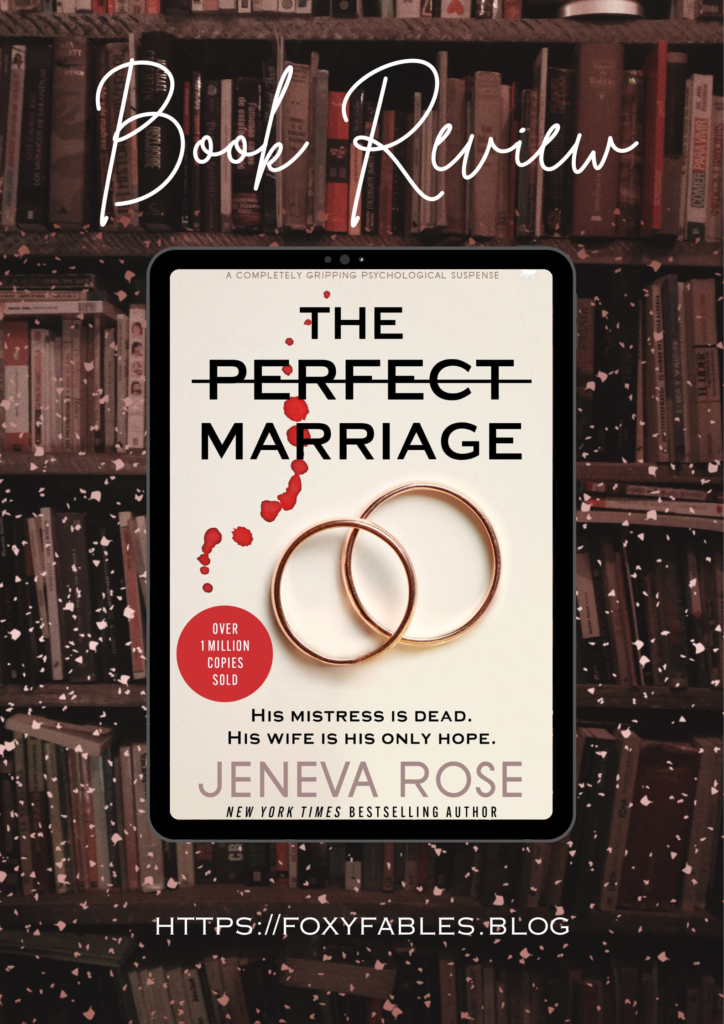Imagine this: what if the person you love the most turns out to be someone you hardly know? This tantalizing premise forms the crux of “The Perfect Marriage” by Jeneva Rose. The novel unfolds a thrilling narrative, entwining elements of mystery, romance, and psychological intrigue, beckoning readers to question the very essence of love and trust. In this review, we will dissect the intricacies of the plot, the depth of the characters, the themes that resonate throughout, and the overall impact that this compelling tale leaves on its audience.
At the heart of “The Perfect Marriage” is a marriage that, on the surface, appears idyllic. The protagonist, a charismatic and seemingly devoted husband, operates a successful law firm. His wife, a talented and independent woman, is an accomplished professional who possesses an undeniable charm. Yet, as readers delve deeper, they begin to peel back layers of their seemingly flawless union and discover hidden complexities that challenge the notion of a perfect relationship.
One might wonder: can a marriage truly endure under the weight of deception? As the story unfolds, it becomes evident that secrets can fester within even the most seemingly harmonious partnerships. The narrative intricately weaves dual perspectives, compelling readers to navigate both the husband’s and wife’s experiences. This exploration of duality fosters an acute sense of tension, making one ponder whether love is rooted in trust or vulnerability.
The cast of characters is carefully crafted, each harboring desires and fears that reflect the profound intricacies of human relationships. The protagonist’s husband is not just a successful lawyer; he is a man burdened by ambition and an equally glamorous facade. On the other hand, the wife emerges as a multi-dimensional character torn between her own aspirations and the obligations of matrimony. This interplay allows readers to connect with their aspirations, disappointments, and ultimately, their choices.
As the plot thickens, the narrative takes a suspenseful twist that amplifies the stakes of the characters’ decisions. The author’s keen observational prowess allows her to draw parallels between the world of law—where truth is often obscured—and the complexities of personal relationships. The courtroom scenes are riveting, steeped in drama, as ethical dilemmas unravel alongside personal revelations. It’s here that the characters confront their most audacious fears. Will they emerge united or irreparably fractured?
One cannot discuss “The Perfect Marriage” without acknowledging its exploration of betrayal and accountability. The tension between fidelity and personal freedom reveals itself in profound ways, prompting readers to reflect on societal expectations about marriage. Rose presents a narrative that boldly challenges the traditional norms of partnership, ultimately instilling a sense of empowerment and introspection.
Thematically, the novel navigates the precarious labyrinth of love and deceit, with each chapter inviting the reader to reconsider their beliefs about matrimonial bliss. The challenge posed to the reader is stark: can harmony coexist with hidden truths? Rose skillfully crafts moments that elicit empathy, compelling readers to question their own perceptions of love. The juxtaposition of love and betrayal throughout the storyline invites introspection, allowing individuals to ponder their own experiences.
Moreover, the pacing of the novel is both enticing and relentless, urging readers to devour each page as they seek resolution. The author’s strategic deployment of cliffhangers creates an engaging reading experience, prompting one to ponder the intricate dance of cause and effect within relationships. As the narrative unfolds, it becomes abundantly clear that actions carry weight beyond the immediate moment, provoking significant repercussions that ripple through the lives of the characters.
Another crucial layer in “The Perfect Marriage” is the exploration of identity—both personal and relational. Characters grapple with self-conception, questioning their roles within a romantic framework. This internal conflict provides depth and relatability, drawing readers further into the collective human experience. Each character’s journey serves as an allegory for marital expectations in contemporary society, scrutinizing the thin veil separating reality from idealism.
As the climax approaches and tensions reach a crescendo, the author artfully navigates the treacherous waters of individual desires versus shared obligations. The resolution is both exhilarating and thought-provoking, leaving readers with lingering questions about loyalty, choice, and the very fabric of commitments made. It invites contemplation: how can one balance personal fulfillment against the promise of partnership? The resolution may elicit mixed emotions, leaving readers to ponder the complexities long after they’ve turned the final page.
In conclusion, “The Perfect Marriage” by Jeneva Rose is a masterful blend of suspense, romance, and psychological exploration. Readers are challenged to confront their own assumptions about love and fidelity, prompting them to reflect on the hidden dimensions of relationships. With its captivating characters and a plot rife with tension, this novel bewitchingly weaves a story that stays with the audience, compelling them to navigate their own emotional landscapes.
The interplay of mystique and vulnerability casts a spell that resonates, urging individuals to consider how well they truly know those they hold dear. What does it mean to share a life with someone—can love truly be unconditional, or are there always expectations tethered to it? Ultimately, Rose’s novel serves as a sumptuous reminder of the complexities of the human heart, leaving us all to grapple with the imperfect realities of love.
